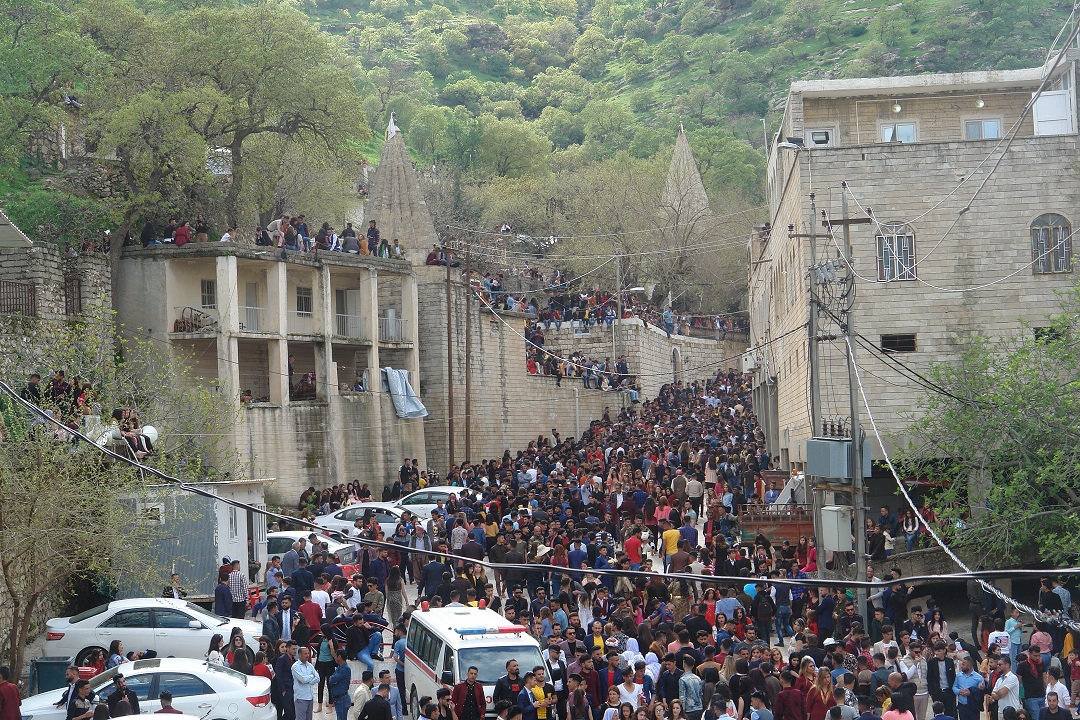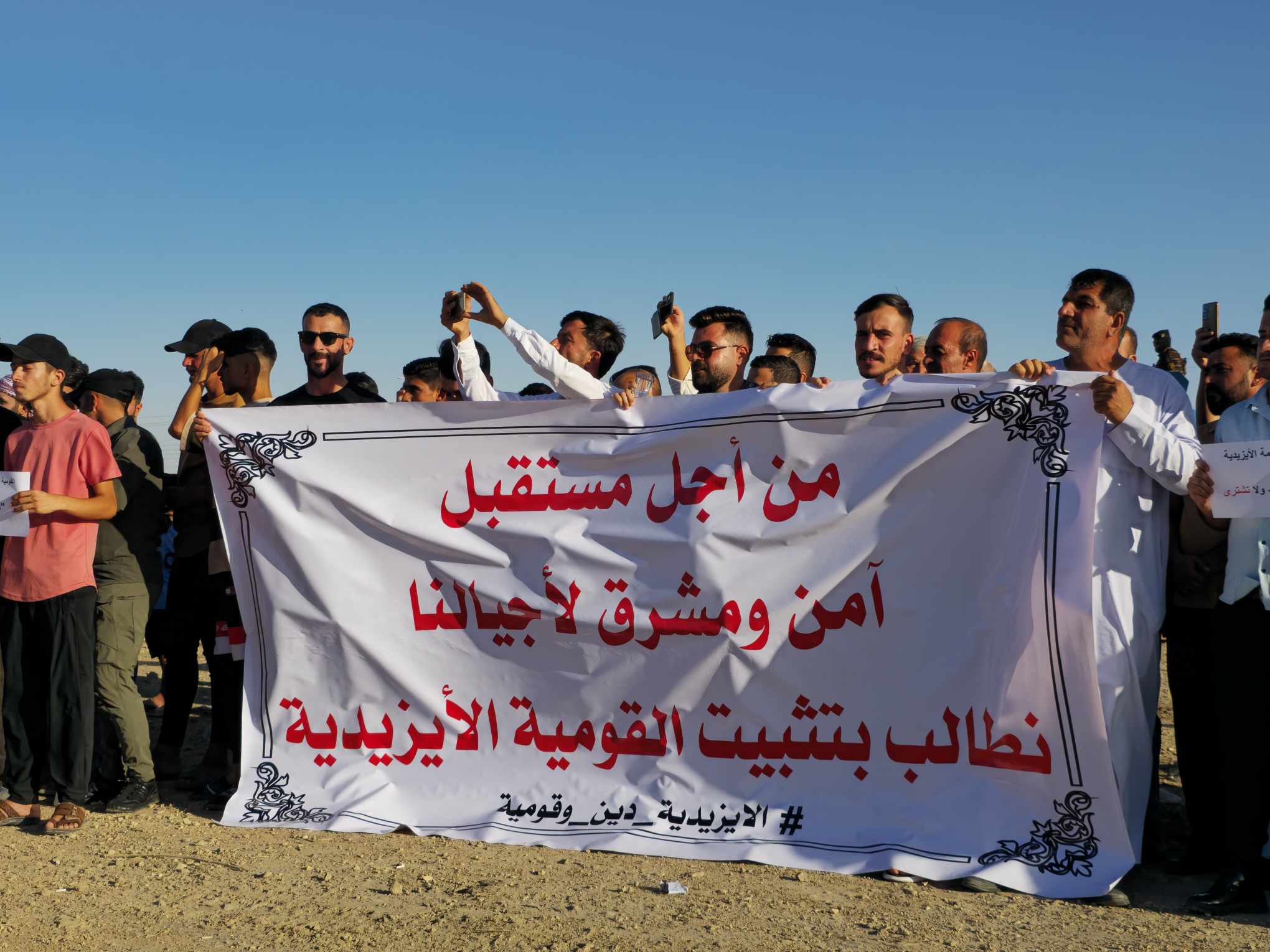A draft law recognizing the Ezidi (Yazidi) component as an independent ethnicity has sparked deep controversy and disagreements among the Ezidis recognized in the Iraqi constitution as a religious group that practices its worship and rituals in the Kurdish language.
The disputes that raged a couple of weeks ago came after the draft law on “Ezidi Ethnicity” was presented, signed by 182 Iraqi lawmakers, and referred to the parliamentary legal committee.
Nayef Khalaf Sido, head of the Ezidi bloc in the Iraqi parliament (the Ezidis have a single quota seat), described this step in the request that included the draft law as aiming “to achieve justice for the children of the Ezidi component who were subjected to genocide.”
The request to recognize the Ezidis as an ethnicity was based on Article 3 of the Iraqi Constitution, which stipulates that “Iraq is a country of multiple ethnicities, religions, and sects...” Therefore, Sido believes that the Ezidis have the right to be recognized as an ethnicity, similar to Arabs, Kurds, and Turkmen.
Sido's point of view and efforts have been the subject of disagreement among the Ezidis for years, but this disagreement never reached the stage of submitting a draft law.
“The Ezidi worship, rituals, and religious texts are all in the Kurdish language. After all these years, I do not know by what mechanism we renew our identity?” says Pir Khidir Jaafar, an Ezidi social figure, who believes this step will only lead to “discrimination between the Ezidis.”
Ezidi stems from the word (Ezdan - God), an ancient monotheistic religion considered an extension of the Mithraic religion. The sacred Ezidi texts consist of two parts, the Book of al-Jalwa and the Balck Book (Bushafa Rash), in addition to sayings, verses, and poems, and they are in the Kurdish language (Kurmanji dialect).
Pir Khidir told (KirkukNow), “Our fathers, grandfathers, and the generations that preceded us all spoke the Kurdish language. Their fashion, food, and all details were in line with Kurdish. The Emir of the Ezidis and the head of the Spiritual Council spoke the Kurdish language, so, strangely, some people demand another identity for the Ezidis.”
Ezidism is an old Middle Eastern monotheistic ethnic religion of one God who created the world and entrusted it to seven Holy Beings, known as Angels. The outstanding among these angels is Melek Taus who is the leader and has authority over the world.
Ezidis speak Kurmanji, one of the two main Kurdish dialects. Part of Ezidis consider Ezidism both a distinct religious and ethnic identity and do not identify themselves as Kurds.
Efforts to define Ezidis as an ethnicity, according to Pir Khidir, “do not bring good hope,” and he fears that “the Ezidis will become victims because of this and their value will be diminished.”
Paragraph Two of Article Two of the Iraqi Constitution mentioned the Ezidis as a religion and indicated that the state is committed to protecting all its religious rights.
Sido was a former member of the Ezidi Progress Party which adopted the slogan “Consolidating Ezidi Ethnicity.”
(KirkukNow) have tried to obtain statements from Sido (The quota Ezidi seat - Nineveh) but without results.
The Ezidi Progress Party has been active since 2006, after its split from the Reform and Progress Party, founded in 2004, and adopted the idea of recognizing the Ezidis as an ethnicity.
“We also want to have our nationality, our Ezidi religion, and our nationality must also be Ezidi,” Saeed Battoush, head of the Ezidi Progress Party, told KirkukNow.
Battoush says that his party was founded to support the Ezidi identity, and he is the one who came up with the idea of establishing Ezidi ethnicity, so they are keen to achieve this goal.
“The Iraqi government imposed on us at the time Iraqi identity, after which the regional government imposed on us belonging to Kurdish identity, but we do not want any party to impose its identity. We respect all ethnicities, but we want our own.”
Ezidis in Iraq are estimated at 550,000 people. The members of this component were displaced and more than 100,000 Ezidis immigrated from Iraq, according to statistics revealed by the General Directorate of Ezidi Affairs in the Kurdistan Regional Government KRG.
Ezidis mainly live in Sheikhan District (located north of Mosul and administratively affiliated with Erbil Province, capital of the Iraqi Kurdistan Region IKR) and Shingal (Sinjar) District (120 km west of Mosul and administratively affiliated with Nineveh Province).
Haider Shasho, commander of the Ezidi forces in Sinjar, told KirkukNow, “The goal of what is happening now is to distract people to make them forget the issue of recognition of genocide, reconstruction, and compensation.”
He believes that those who support the idea Ezidi ethnicity “are a minority whose number does not exceed 20 Ezidis.” On the other hand, the majority of Ezidis consider themselves Kurds.

Holding Red Wednesday (Ezidi New Year) ceremonies in the Lalish Temple, Sheikhan, 2019. Photography: Kirkuk Now
In August 2014, Shingal district fell into the hands of militants of the "Islamic State of Iraq and the Levant - ISIS", and thousands of Ezidis were killed, kidnapped, and displaced.
Shesho believes that there are "political hands behind the issue of establishing Ezidi nationalism, and their main goal is to isolate the Ezidis and Sinjar from the Kurds."
The Ezidi Spiritual Council, which was headed by Tahsin Beg, the former Emir of Ezidis in Iraq and the world, issued a statement in 2010 in which he said, “We are proud of our Kurdish Identity, based on the facts of language, history, and geography..”, and this was in response to efforts to register the Ezidis as an independent nationality in the information and data on the general population census.
The institution for managing the affairs of the Ezidis in the Ezidi Spiritual Council is headed by the Emir of the Ezidis. The institution is an umbrella for Baba Sheikh, the Sheikh Al-Wazir, and the head of the Qawwalin, and all decisions related to the Ezidi component are issued by that institution.
Saeed Jardo, head of the Supreme Committee of the Lalish Cultural and Social Center, told (KirkukNow) that “the authentic section of the Kurdish people who to this day preserve the Kurdish heritage and traditions are Ezidis, and their attire, food, heritage, traditions, and religious texts are all Kurdish,”
He expressed his regret that there are attempts to “create gaps between Ezidi and Kurdish, while both are two souls in one body.”
The issue of establishing Ezidi nationalism came into public in 2023, after MP Sido directed a request to the General Secretariat of the Iraqi Council of Ministers, for the official departments to deal with the Ezidis as a nationality and a religion, yet the General Secretariat rejected the request and stressed that Ezidism is considered a “religion” not an ethnicity under the Iraqi constitution.
The head of the Progress Party says that the history of Ezidi and Lalish dates back thousands of years, “It arose before the establishment of the Kurdistan Regional Government and Kurdish nationalistic thought, for Lalish and Older Ezidi and 80 percent of Ezidis support the establishment of Ezidi nationalism.”
On June 14, 2024, some Ezidis from Sinjar organized a gathering in which they expressed, by raising several slogans, their support for Ezidi nationalism.
"We in Nineveh were deprived of everything after 2003 and were robbed of our entitlements to administrative positions. The Kurds have always benefited from our votes without granting us our rights,” Battoush said.
The Ezidis, as a religious minority in Iraq, were allocated a seat in the Iraqi parliament for Nineveh and a seat in the provincial council, both with a quota system.
Dara Hama Ahmed Amin, a member of the Legal Committee in the Iraqi Parliament, says that discussions have not begun on the proposal to recognize the Ezidi ethnicity because Parliament is in a legislative recess.
“I believe this issue has been settled in the constitution, which mentioned the nationalities that live in Iraq, for example, the Kurds and Arabs,” he said. While referring to some other components, such as Christians, Ezidis, and Sabians, they are treated as religious groups and not as independent ethnicities.
Dara believes that because of the differences between the Ezidis, who are divided into one front that considers itself affiliated with the Kurdish nation and the other thinks differently, “even if signatures are collected and the draft law is discussed, the matter will not be that easy, because any law that is passed must comply with the constitution and not violate a constitutional text.”
There are other issues over which the Ezidis are divided, including the issue of appointing the Emir of the Ezidis in Iraq and the world. So far, three people have declared themselves princes of the Ezidis, in addition to the disagreement over the position of the Ezidi religious authority.
These disputes come at a time when the fate of more than 2,000 kidnapped Ezidis remains unknown, while thousands of Ezidi families are still living in displacement tent camps in the IKR.





